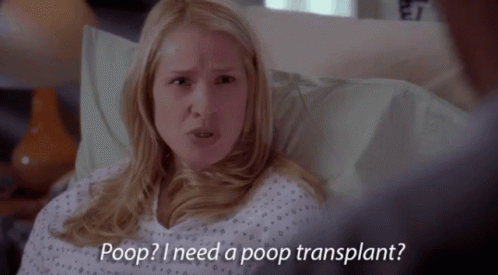Microbiota and Fecal Matter Transplants
Fecal matter is a topic of rare discussion. I, for one, never choose to talk about my bowel movements. However, it is becoming more of a prominent topic in the scientific community. As discussed in this article published by The Daily Beast, fecal matter transplants are a thing of the future. During a fecal matter transplant, healthy stool is taken and injected into the recipient’s colon. The point of this procedure is to transfer healthy microbiota to the patient’s gut, which has a deficit in the availability of bacteria that is needed for a healthy microbiome. 
Gif via Grey’s Anatommy
Fecal matter transplants are used to treat Clostridium difficile (C. diff). C. diff is naturally present in everyone’s microbiome, including yours (even though you think you’re above that). This becomes a problem when a person has been on antibiotics. We tend to think of antibiotics as a good thing, but like everything else, good things come to an end. Antibiotics kill all the bacteria in your gut. C. diff is resistant to antibiotics and when it is the only bacteria that remains, the infection will become symptomatic. Symptoms result in a large loss of electrolytes and fluids. In order to reintroduce healthy bacteria back into the microbiome, a fecal matter transplant is done. The more diverse microbiome a person has, the better donor they will be, they carry more healthy bacteria and have a better immune system.
Thinking about the vast amount of different microbiota in our gut makes me wonder why I don’t follow that “gut feeling” more often. The microbiome can be altered and used to treat many different diseases, such as: multiple sclerosis, cancer, IBS, and many others. Recent research, presented in the article by The Healthline, has shown that bacteria that originates in our gut is able to travel through the central nervous system and to the brain during flare-ups of the disease. The microbiome can alter a change in the plasma that allows it to create IgA, which can then form other products that reduce inflammation.
CRAAP Test (~fitting~)

The CRAAP test is a model that we use to make sure that our sources are accurate and reliable. We look at currency, relevance, authority, accuracy, and purpose.
CRAAP for Daily Beast
The Daily Beast article referenced above passes the CRAAP test. This article was published on January 22nd, 2019 (which is within the past six months). I used this article to gain a better understanding of what a fecal matter transplant was and the main disease that it is used to treat, allowing me to answer the research question presented to me. The author of this article was Molly Enking and she used research information published in New Zealand, conducted by Justin O’Sullivan. The content of this article was primarily fact based, with no upfront or hidden biases. Throughout the article, they are not trying to sell or advertise anything, strictly talking about the new research that was presented on fecal matter transplants.
CRAAP for The Healthline
The Healthline article was published on January 25th, 2019, recent enough to pass our CRAAP test. This article has been fact checked and gave me the information necessary for answering the research question concerning other diseases associated with microbiota and manipulation of the gut biome. The author of this article was Caroline Craven, publishing research conducted by the National Multiple Sclerosis Society. This article was all fact based and was not trying to sell or advertise anything.

Brooke, I think you did a great job!! Awesome article!!
LikeLike